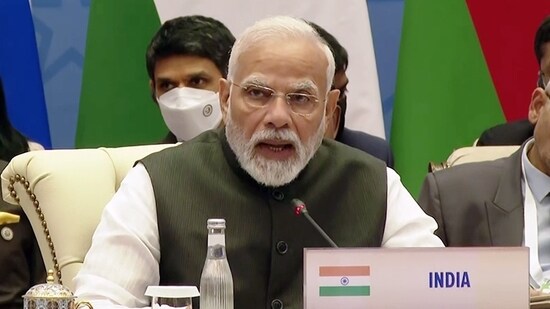
IS INDIA UNDERMINING THE SCO?
The 24th meeting of the Council of Heads of State of the Shanghai Cooperation Organization (SCO) is set to start today (July3) in Astana, Kazakhstan. Recent reports suggest that due to the ongoing parliamentary session, Indian Prime Minister (PM) Narendra Modi has decided not to attend the summit. This development has sparked renewed discussions about the seriousness of India's membership within this regional bloc. It is noteworthy that India assumed the chairmanship of the SCO last year and chose a virtual format for the meeting of the Council of Heads of State, raising important questions about India's commitment to the organisation and concerns about its level of engagement within the SCO. This has also led to discussions about whether India is fully leveraging its position within this influential regional bloc.
SCO is a regional intergovernmental organisation that was founded in 2001 with China, Russia, Kazakhstan, Kyrgyzstan, Tajikistan, and Uzbekistan as its founding members. The first expansion of this regional grouping occurred in 2017, when New Delhi and Pakistan were granted full membership. The Islamic Republic of Iran recently obtained permanent membership in the SCO, and in the Astana Summit in July 2024, Belarus is going to be the newest permanent member. With the addition of new members, SCO has grown to be the largest regional organisation in terms of geography, demography, and economic potential. Geographically, SCO has expanded beyond Eurasia to include South Asia and West Asia, significantly increasing its geopolitical clout and influence.
India has historic ties with the Eurasian region, but Pakistan's formation has made direct contacts challenging. To re-engage with Eurasian countries, India joined the SCO. India's presence in this organisation also counterbalanced China's dominant position. Moreover, India's presence in the SCO ensures that the organisation is not perceived as anti-West. Other than Russia, China and Iran, no member country, especially the Central Asian countries, wants to be seen in this light.
Since becoming a full member of the organisation, India has actively and significantly contributed to the SCO. Some initiatives taken by India include the first-ever SCO Startup Forum, a new SCO Special Working Group on Startups and Innovation, a new SCO Sub-Group on Cooperation in Traditional Medicine, the SCO Young Scientists Conclave, and the SCO Consortium of Economic Think Tanks. However, India's active involvement in the SCO is being affected by its challenging bilateral relationships with both Pakistan and China. To ensure that the SCO's focus is not diverted, it is crucial for New Delhi to become proactive in its engagement with the organisation and effectively counterbalance China and Pakistan.
The SCO strongly emphasises addressing security issues, particularly the threats of terrorism, extremism, and separatism. India has been vocal about its specific concerns regarding these issues, consistently raising them in SCO meetings and summits. Of particular concern is Pakistan's support of terrorism, which has significant implications for India and the broader Central and South Asian regions. This ongoing issue has serious and far-reaching repercussions for regional stability and security.
The SCO's core focus is Central Asia, and with the new members coming up, it needs to be ensured that this focus is not diverted. The SCO's expansion poses certain challenges for India as well. Turkey is a SCO dialogue partner and is aspiring to become a full member. If Ankara is granted permanent membership, it will undermine New Delhi's ambitions while strengthening the Turkey-Pakistan axis. At the same time, the expansion also presents multiple opportunities for India. Entry of Iran may expedite the focus on India-led connectivity initiatives, namely, the International North-South Transport Corridor (INSTC) and Chabahar Port. Also, the permanent membership of Belarus can help Russia strengthen its position in SCO. India has good relations with all the member countries except for China and Pakistan. In this context, it becomes imperative for new Delhi to make its presence felt in SCO.
If PM Modi is unable to attend the summit in person, he may participate virtually, as requested by the president of Kazakhstan, Kassym-Jomart Tokayev, who is the current chair of SCO. Additionally, a number of virtual bilateral meetings may be organized, particularly with Central Asian countries and Iran. The ongoing Ukraine crisis has sparked increased talks about Eurasian connectivity, and recent terrorist attacks in Russia, including in Moscow and Dagestan, have highlighted the region's vulnerabilities in terms of security and stability. This year, the SCO summit will focus on connectivity and counterterrorism. India's agenda for the summit should concentrate on addressing these two critical issues.
India's participation in the SCO holds significant strategic and diplomatic importance. India's proactive engagement within the SCO is imperative for ensuring regional stability, countering common security threats, and leveraging economic and connectivity opportunities. The upcoming SCO summit presents a crucial platform for India to reaffirm its commitment to the organisation's goals of enhancing cooperation, addressing security challenges, and promoting connectivity initiatives. As India navigates its complex bilateral relationships with China and Pakistan, it must actively assert its presence within the SCO and work towards advancing its priorities while contributing to the collective objectives of the organisation.
This article is authored by Pravesh Kumar Gupta, associate fellow (Eurasia), Vivekananda International Foundation, New Delhi.
Read more news like this on HindustanTimes.com
2024-07-03T07:44:33Z dg43tfdfdgfd